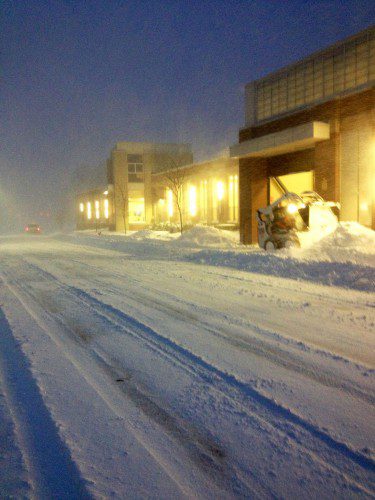By BOB BURGESS

LIKE JUST ABOUT every main road in eastern Massachusetts, North Avenue had barely any traffic this morning before dawn. In this photo, the front of the Municipal Gas and Light Department is cleared of snow. (Colleen Riley Photo)
WAKEFIELD — Schools were closed and motorists, for the most part, stayed off the roads this morning as a powerful winter storm blasted the region with high winds that whipped light, fluffy snow into formidable drifts.
According to DPW Director Richard Stinson, crews had a tough time keeping ahead of the might of the blizzard as they performed snow removal operations overnight, in part because visibility was so poor and the wind kept blowing snow back onto streets plow drivers had just cleared.
By 8:30 a.m., about a foot of snow had fallen here, with several more inches forecast up to noon today. Wakefield is expected to get between 18 and 24 inches of snow, but Stinson said the total had been downgraded between both 6 p.m. to midnight and after midnight Wednesday, when the blizzard is supposed to start heading farther out the sea.
The DPW had about 75 pieces of equipment at its disposal for snow removal, which includes about 45 private trucks.
Stinson explained that once the storm began to slow down a bit — predicted to be after noon today — crews would have the opportunity to better clear streets.
“We’re just trying to keep things open right now,” he said before 9 a.m. as the snow continued to fly around.
Wakefield Municipal Gas and Light Department General Manager enthusiastically reported around the same time that not one call was received for either a gas or electric problem overnight.
During a press conference this morning, Gov. Charlie Baker said somewhat colder-than-expected weather produced light and fluffy snow, which may be helping keep the overall number of power outages down.
At 7 a.m., National Grid reported fewer than 7,000 outages, the vast majority on Nantucket. NStar also had about 7,000 customers without power, mostly on Cape Cod and the South Shore.
Wakefield Supt. of Schools Dr. Stephen K. Zrike Jr., who cancelled local classes today, said a number of factors go into his decision whether to have school. The most important is the safety back and forth to the school buildings for students, their parents and staff.
Zrike has spoken to Stinson this morning as well as school leaders in other communities as he gathers information on whether to cancel school Wednesday. “I hate to cancel school because it can add to our school year and because of the lost classroom time. I’ll have a better idea around midday or early this afternoon. I don’t want to wait too long so parents can plan accordingly. But right now I would say it is not a forgone conclusion that we will have school tomorrow.”
Another factor in his decision is that tomorrow is a scheduled half day. A delayed opening wouldn’t leave much time for learning and it might be better to just close for the day so DPW crews can complete snow removal operations at the town’s various schools.
Earlier today, Gov. Baker seemed relieved that widespread damage reports were down. There was no catastrophic flooding along the coastline.
“So far, so good,” he said at a briefing at the state’s emergency management bunker in Framingham.
A ban on nonessential motor vehicle travel took effect at midnight, and roads and highways were mostly clear of traffic other than snow removal equipment and emergency vehicles. Schools, government offices and most businesses were closed.
Heavy bands of snow fell, and some towns, including Sandwich on Cape Cod and Oxford in central Massachusetts, reported more than a foot and a half of snow. Total accumulation from the storm, which was expected to last most of Tuesday, was expected to reach or exceed 2 feet in most of Massachusetts, perhaps making it one of the top five snowstorms of all time.
Flooding along the coast had been a major concern of state officials, but the 4:30 a.m. high tide passed without any “catastrophic, life-threatening situations,” said Kurt Schwartz, the state’s emergency management director.
State and local officials assisted in a handful of voluntary evacuations in Marshfield, Hull and Scituate, Schwartz said, but they were not of a “life and death” nature. Some coastal roads were also closed because of flooding, which isn’t unusual for a storm of this size.
The Pilgrim nuclear power plant in Plymouth was forced to go offline after its main transmission lines went down, but there was no danger, said Matthew Beaton, state secretary of energy and environmental affairs. It was not clear when the facility, the state’s only nuclear reactor, would resume generating power.
“All safety systems worked as designed. Plant conditions are stable, and there is no threat to the safety of plant workers or the public,” the plant said in a statement.
Baker said fewer than 200 people spent the night in emergency shelters around the state. But he urged residents to stay inside since snow was expected to continue falling at a rate of up to 2 inches an hour.
Baker planned to meet later Tuesday with local officials and his counterparts in neighboring states to determine when the travel ban might be lifted.
— The Associated Press contributed to this report.




